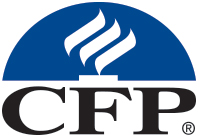Certified Financial Planner™ (CFP) Professional

These days, no one wants to be called a "stock broker" or an "insurance agent". Professionals and salespeople both refer to themselves as either "financial advisors", "financial planners", or "wealth managers". There is no regulation (like with doctors, attorneys, etc.) to prevent otherwise. To further muddy the waters, there are also about 30 designations that an advisor can put behind his or her name. Some of these designations are tough to earn and respected in the industry while others are the equivalent of a one-day correspondence course. At best, these diploma-mill type designations confuse the public, and at worst, are used to mislead consumers.
So how do you decipher between a professional and a salesperson? And how do you wade through the alphabet soup of designations?
Look for the credential that is the most recognized in the financial services industry and the media – CFP®, or CERTFIED FINANCIAL PLANNER™. An advisor who is a CFP® professional is someone who has at least a certain level of education and work experience, passed a rigorous exam, and has agreed to conduct themselves in an ethical manner.
Remember: This should not be your only criteria when deciding on an advisor, but it does tell you who is committed to this field.
Below are the CFP® certification requirements listed on the website of the Certified Financial Planner Board of Standards.
Experience: CFP® professionals must have a minimum of three years experience in the financial planning process prior to earning the right to use the CFP® certification marks. The hands-on experience gives CFP® professionals the practical financial planning knowledge and financial counseling skills to create a realistic financial plan that meets your individual needs.
Education: CFP® professionals must develop their theoretical and practical financial planning knowledge by completing a comprehensive course of study at a college or university offering a financial planning curriculum approved by the CFP Board. Other options for satisfying the education component include submitting a transcript review or previous financial planning-related course work to the CFP Board for review and credit, or showing the attainment of certain professional designations or academic degrees that cover the CFP Board’s financial planning curriculum.
Examination: CFP® professionals must also pass a comprehensive two-day, 10-hour CFP® Certification Examination that tests their ability to apply financial planning knowledge to real-life situations. Based on regular research of what planners do, the exam covers the financial planning process, tax planning, employee benefits and retirement planning, estate planning, investment management and insurance.
Ethics: As a final step to certification, CFP® professionals agree to abide by a strict code of professional conduct in which they are required to uphold the principles of integrity, objectivity, competence, fairness, confidentiality, professionalism and diligence as outlined in the CFP Board’s Code of Ethics. CFP® professionals are required by the Rules of Conduct to put your interests ahead of their own at all times and to provide their financial planning services as a “fiduciary” (acting in the best interest of clients). The CFP Board also performs a background check during this process, and each individual must disclose any investigations or legal proceedings related to their professional or business conduct.
Only advisors who have fulfilled the certification and renewal requirements of the CFP Board can display the CFP® certification marks. Once certified, CFP® professionals are required to maintain technical competence and fulfill ethical obligations. Every two years, they must complete a minimum 30 hours of continuing education to stay current with developments in the financial planning profession and better serve clients. Two of these hours are spent studying or discussing the CFP Board’s Code of Ethics or Practice Standards. In addition to the continuing education requirements, all CFP® professionals must disclose any public, civil, criminal or disciplinary actions that may have been taken against them during the previous two years as part of the renewal process.
Make sure your next financial advisor is a CFP® professional.

